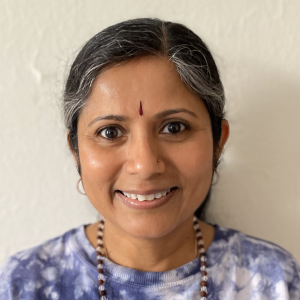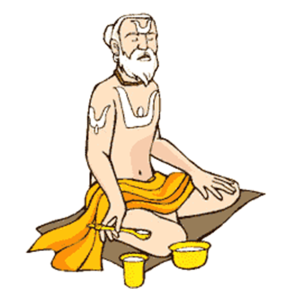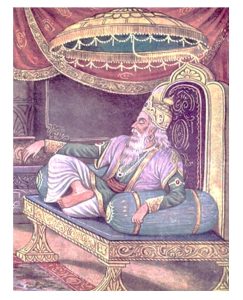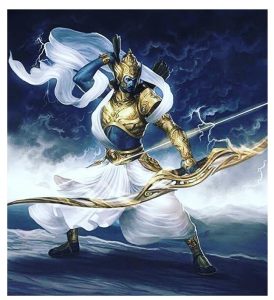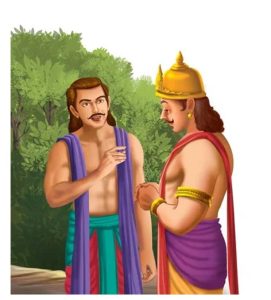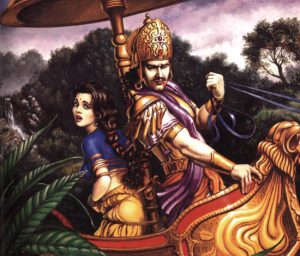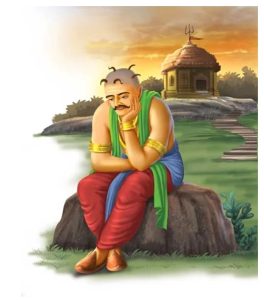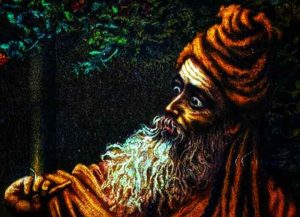By Nirooshitha Sethuram, Yogaratna
Graphics by Sheralee (Shambhavi) Hancherow
Once a brahmin priest, who was a scholar in Vedas and who exceled in penance and discipline visited the court of King Dhritarashtra. The king greeted him with respect and offered him a seat.
While they were talking, the brahmin revealed that he had seen the Pandavas in the forest. He went on describing the details, explaining the hardship they were living under. Hearing about the condition of the Pandavas, Dhritarashtra’s heart ached and tears fell from his eyes.
The brahmin continued, saying that even with all the hardship, the eldest of the Pandavas, Yudhishthira, with his severe penance had acquired boons not only from the sages on this earth but also from the celestial beings. Bhima had gotten new physical strength and power as blessings from Lord Hanuman. Arjuna, because of his austere penance, received Pashupata Astra from Lord Shiva, and he also got incomparable weapons from Indra.
The brahmin added that Nakula & Sachdeva along with Draupadi were stronger than ever before in their hearts & minds. He also mentioned how all the rishis and yogis were visiting them and, most of all, Krishna himself was visiting them quite often.
Hearing all this from the brahmin, Dhritarashtra’s mood changed from sympathy to fear & worry. Karna and Shakuni also heard all this, along with Duryodhana. Duryodhana got angry and really wanted to humiliate and insult the Pandavas while in their unfortunate circumstances. He decided to get permission from his father to go witness the suffering of the Pandavas. This was something he had been wanting to do for a very long time. As he knew his father would not allow him to humiliate or insult the Pandavas, he had to devise an alternate plan.
Duryodhana told his father Dhritarashtra that they wanted to visit the village near the forest where the Pandavas lived. They were going to inspect a cow farm which belonged to the Hastinapura kingdom. As the King was afraid of them going so close to where the Pandavas lived, it took a lot of convincing to get the permission.
The three of them along with other Kauravas went to the forest. They brought men and women in fine clothing and jewelry, hoping that it would provoke the Pandavas and Draupadi. They first came across a serene stream and decided to refresh themselves by taking a bath in it. But they were not the only ones in the stream. There were some Gandharvas, celestial beings, including their chief Chitrasena, already there having a nice time.
That was disturbing to the Kauravas. Duryodhana demanded that the Gandharvas leave. They ignored Duryodhana and refused to leave. So the Kauravas ended up fighting them, only to lose badly. Karna was insulted so much that he ran away. The Gandharvas defeated the Kauravas and imprisoned them, including the men and women who came along with them.
The Pandavas heard the news about Kauravas’ capture from the soldiers deserting the Kauravas. Bhima was so delighted to hear the news, thinking that the Gandharvas had done what he had been wanting to do so badly. But Yudhishthira advised Bhima and Arjuna to go save them, as it’s their dharma to be there for their family.
So, the Pandavas gathered the Kaurava soldiers who had scattered and went to war with the Gandharvas. Chitrasena’s anger vanished as soon as he saw the Pandavas, especially Arjuna, his beloved student. He respected the Pandavas’ request to release their family members. Per their wish, Chitrasena released the Kauravas.
Yudishthira advised Duryodhana to stop doing unkind acts in the future. He sent Duryodhana and the others back to Hastinapura, lovingly asking them to convey his best regards to the elders and other family members. Duryodhana was terribly humiliated by this incident and felt miserable. He was so angry. He couldn’t accept that the Pandavas rescued him and his family from the Gandharvas. He didn’t want to live with this disgrace. But after Karna, Shakuni and the other brothers convinced him otherwise, they all returned to Hastinapura.
Later one day, when the Pandavas had gone out hunting, Jayadratha was on his way to Hastinapura and saw Draupadi in the forest. Jayadratha was the King of the Sindhu Kingdom, married to Duryodhana’s sister Dushala. Jayadratha was struck by the beauty of Draupadi. Not knowing who she was, he sent a soldier to inquire about her. After knowing who she was, he invited her to come live with him, mocking her situation with the Pandavas.
Draupadi was furious about this request and refused harshly, telling Jayadratha to leave the ashram immediately. Filled with lust, Jayadratha kidnapped her. He forcibly pulled her into his chariot and drove away. Draupadi screamed so loudly that those who were nearby heard the cry and ran to rescue her, but the chariot drove away fast.
When the Pandavas reached the ashram, they heard about the incident from those who were nearby. They immediately went after Jayadratha. Jayadratha’s army was no match for the angry Pandavas. When Jayadratha saw Bhima and Arjuna approaching, he did his best to save his life by pushing Draupadi out of the chariot. Seeing this Bhima got furious and captured Jayadratha in no time.
They took him to Yudhishthira. Yudhishthira asked Draupadi to decide the punishment for Jayadratha, reminding her that he was the husband of their cousin Dushala. Even though she was filled with rage and bitterness, Draupadi valued Yudhishthira’s comments and asked Jayadratha’s head to be shaved, leaving only a few clumps of hair. The punishment was carried out according to her wish and Jayadratha was let go to return to his kingdom.
Jayadratha was too ashamed to go home to his family and remained in the forest. He did intense austerities and meditation on Lord Shiva, seeking a boon to take revenge on the Pandavas. Pleased with his deep tapas, Lord Shiva appeared before Jayadratha. Jayadratha asked Lord Shiva to give him a boon to defeat the Pandavas and their army in a battle.
As Lord Shiva had already given a boon to Arjuna that he couldn’t be defeated, Shiva altered the boon that Jayadratha asked. Lord Shiva said that Jayadratha could resist the other four Pandava brothers for one day of the battle. With no other choice, Jayadratha accepted the boon and went home. After getting the boon, he forgot the fact that he was the one who wronged them in the first place.
Duryodhana, inspired by Yudhishthira’s Rajasuya Yaj~na, always wanted to perform one himself. But the brahmins and the elders didn’t agree with his idea. So instead, he planned to do a different special yaj~na. All the rishis and sages visited the kingdom to attend this yajna. With Karna’s dedication and loyalty, Duryodhana successfully finished the yaj~na. At this ceremony, Karna made a promise to Duryodhana that he would kill Arjuna in war. He vowed to give up eating meat and alcohol until then. It is also believed this is when Karna took the vow of giving as well. By this, he became the benevolent King of the age.
One fine day, Rishi Durvasa visited Hastinapura with his many disciples. Knowing the sage’s hot temper, Duryodhana didn’t want to be cursed, so he served Durvasa at his best to please him. The sage was delighted by Duryodhana’s service and asked him to request a boon. Duryodhana cunningly requested the sage to visit the Pandavas in the forest. Of course, the reason behind this request is that he was hoping that this was a great opportunity to bring downfall to the Pandavas. Knowing the sage’s temperament, Duryodhana was thinking it would be hard for the Pandavas to serve and satisfy the sage and his many disciples with their limited resources.
Duryodhana also requested that the sage visit the Pandavas late in the afternoon. This was to make sure that Draupadi had taken care of everyone, so she would have nothing to offer to the sage and his disciples. The ill mind of Duryodhana was such that, instead of getting blessings from the sage, he was scheming to cause harm to others.
Sage Durvasa agreed to Duryodhana’s request and promised to go visit the Pandavas and Draupadi in the near future. Duryodhana was happy that his plot to bring downfall to the Pandavas was working. He hoped that they would be severely cursed by Rishi Durvasa.
More to come…
- Brahmin priest https://www.bardaionline.com/religion-culture/brahmin/2011/11/20
- King Dhritarashtra https://commons.wikimedia.org/wiki/File:King_Dhritarashtra.jpg
- Chitrasena of the Gandharvas https://www.facebook.com/104289227956814/photos/a.112341960484874/146032953782441/?type=3
- Yudhishthira advising Duryodhana https://www.sawanonlinebookstore.com/duryodhanas-humiliation
- Draupadi being kidnapped by Jayadratha http://3.bp.blogspot.com/_RtUxUYEE7k0/TCf5_1lG91I/AAAAAAAACno/bojrLGnVaKg/s1600/24890_384907723735_171041283735_3934194_7637117_n.jpg
- Jayadratha https://www.sawanonlinebookstore.com/jayadratha-seeks-revenge
- Rishi Durvasa https://hindutempletalk.org/2023/08/17/durvasaa-sage-of-wonder-and-fury/amp
